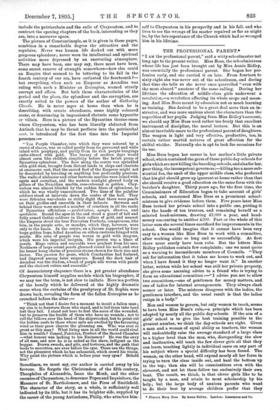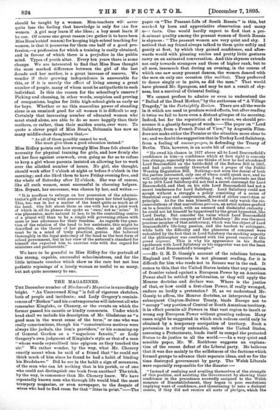THE PROFESSIONAL PARENT.*
"I AM the professional parent," said a witty schoolmaster not long ago to the present writer. Miss Buss, the schoolmistress whose life has just been brought out by Miss Annie Ridley, was essentially the professional parent. She began her pro- fession early, and she carried it on late. From fourteen to sixty-eight she was never out of the schoolroom, and during that time she tells us she never once quarrelled "even with the most absurd" amateur of the same calling. During her lifetime the education of middle-class girls underwent a revolution,—a revolution affecting its whole scope and mean- ing. And Miss Bliss meant by education not so much learning as training. She desired to be a great deal more than an in- structor, and was more anxious about the characters than the capacities of her pupils. Judging from Miss Ridley's account, we should say Miss Buss used rather too freely that excellent instrument of discipline, the moral lecture. But this is an almost inevitable snare to the professional parent of daughters. The weapon is light and very effective, productive, too, in certain rather morbid natures of great affection for the skilful wielder. Naturally she is apt to look for occasions for its use.
Miss Buss began her career in her mother's little private school, which contained the germ of those public day-schools for girls which are now killing the boarding-schools, and alas for her, poor thing, the incompetent governess ;—killing too a more sub- stantial foe, the snob of the upper middle class, who preferred that his girl should grow up ignorant at home rather than that she should receive a good education on the same form with the butcher's daughter. Thirty years ago, for the first time, the Commissioners of Education began to take account of girls' schools, and summoned Miss Buss as a prominent school- mistress to give evidence before them. Five years later Miss Buss turned her private school into a public one, putting it into the bands of ten trustees, and remaining herself as a salaried head-mistress, drawing £1,000 a year, and head- money amounting to another £300. Part or the whole of this latter sum she several times sacrificed for improvements in the school. One would imagine that it cannot have been very easy to a woman like Miss Buss to work with a committee, after working alone so long and so successfully. At first there must surely have been rubs. But the letters Miss Ridley publishes contain few complaints ; one we must quote as a warning to inconsiderate members of Councils. "They ask for information that it takes me hours to work out, and when I have found it they no longer want it." In another letter, written while her school was still her private property, she gives some amusing advice to a friend who is trying to form an educational committee :—" I advise you not to allow two committees,—one of gentlemen for money matters, and one of ladies for internal arrangements. They always clash sooner or later. The mistress disagrees with the ladies, the gentlemen interfere, and the usual result is that the ladies resign in a body."
Men and women to govern, but only women to teach, seems to have been Miss Buss's rule,—a principle which has been adopted by nearly all the public day-schools. If the aim of a girls' school is to give the best training possible to the greatest number, we think the day-schools are right. Given a man and a woman of equal ability as teachers, the woman will undoubtedly raise the average standard of a large class to a higher level than the man, who, disregarding the slow and inattentive, will teach the few clever girls all that they can learn, touching lightly in individual cases on any part of his subject where a special difficulty has been found. The woman, on the other hand, will expend nearly all her force in trying to turn the class inside out, and haul the bottom up to the top ; then she will be conscientious even with the cleverest, and not let them follow too exclusively their own bent. The result, we think, is that clever girls like to be taught by a man, and attain to most scholarship by his help ; but the large body of anxious parents who want to do their beat by average children prefer that they
• Frances Mary Buss. By Annie Ridley. London: Lonrmans and Co.
should be taught by a woman. Men-teachers wil never quite lose the feeling that knowledge is only for the few women. A girl may learn if she likes; a boy must learn if he can. Of course one great reason (we gather it to have been Miss Buss's chief reason) for keeping high-school teaching for women, is that it preserves for them one half of a good pro- fession,—a profession for which a training is easily obtained, and in favour of which there is a prejudice in the public mind. Types of youth alter. Every ten years there is some change. We are interested to find that Miss Buss thought the most marked difference between the girl of the last decade and her mother, is a great increase of reserve. We wonder if their growing independence is answerable for this, or if it is merely the effect of living among a great number of people, many of whom must be antipathetic to each individual. Is this the reason for the schoolboy's reserve ? Picking and choosing, in other words, suspicion and proving of companions, begins for little high-school-girls as early as for boys. Whether or no this masculine power of standing alone is an unmixed good for all women it is difficult to say.
Certainly that increasing number of educated women who must stand alone, are able to do so more happily than their mothers, or rather, than their maiden aunts, ever were. To quote a clever pupil of Miss Buss's, Britannia has now so many middle-class daughters that,— " As all of them possibly cannot be wed, She must give them a good education instead."
Miss Ridley points out how strongly Miss Buss felt about the necessity for physical training for girls, and how firmly she set her face against overwork, even going so far as to refuse to keep a girl whose parents insisted on allowing her to work over the allotted number of hours. No girl, she thought, should work after 7 o'clock at night or before 9 o'clock in the morning; and she liked them to have Friday evening free, and the whole of Saturday after 12 o'clock. She was of course, like all such women, most successful in choosing helpers.
Mrs. Bryant, her successor, was chosen by her, and writes :—
"It is needless to enlarge on her possession of the adminis- trator's gift of relying with generous trust upon her tried helpers. This, too, was in her a matter of the heart quite as much as of the head. She felt about them as one with her in a joint work of which in all its phases she spoke as ours,' not as mine.' It was pleasanter, more natural to her, to be the controlling centre sf a plural will than to be a single will governing others with more or less allowance for their freedom. As regards the ques- tion of the relation of the head to her assistants, this might be described as the theory of her practice, elastic as all theories must be in a mind of truly practical genius. She believed thoroughly in the legal autocracy of the head as the best form of school government, but in her view of the autocrat's standard for himself she expected him to exercise rule with due regard for ministers and parliaments."
We have to be grateful to Miss Ridley for the portrait of this strong, capable, successful schoolmistress, and for the little intimate touches which show us the rare but not less pathetic repinings of a lonely woman so useful to so many, but not quite necessary to one.























































 Previous page
Previous page